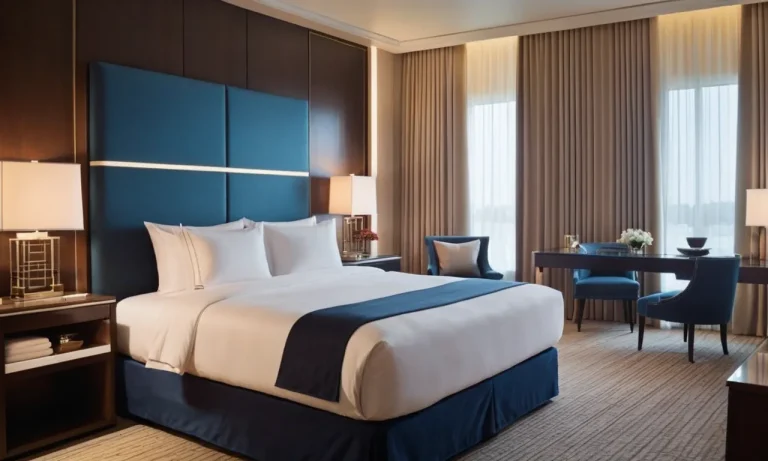Can A Hotel Ban You For No Reason? A Comprehensive Guide
Have you ever been denied entry or asked to leave a hotel without any apparent reason? It’s a frustrating situation that can leave you feeling confused and helpless. The question of whether a hotel can ban you for no reason is a complex one, with various legal and ethical considerations.
If you’re short on time, here’s a quick answer to your question: In most cases, hotels have the right to refuse service or remove guests from their premises, even without providing a specific reason. However, this right is not absolute, and there are certain legal limitations and exceptions that apply.
In this comprehensive article, we’ll delve into the nuances of this issue, exploring the legal framework, common reasons for banning guests, and the rights and responsibilities of both hotels and guests.
We’ll also provide practical tips on how to handle such situations and what recourse options are available.
Legal Framework: Understanding Hotel Rights and Guest Protections
When it comes to the hospitality industry, hotels have a delicate balance to strike between their rights as private businesses and the legal protections afforded to guests. This dynamic is governed by a complex web of laws and regulations that aim to ensure fair treatment while allowing hotels to maintain a safe and enjoyable environment for all.
Let’s delve into this intricate legal framework.
Hotel’s Right to Refuse Service
Hotels, like many other private establishments, generally have the right to refuse service to individuals. This right, however, is not absolute and is subject to certain limitations. According to the Americans with Disabilities Act (ADA), hotels cannot discriminate against individuals with disabilities or deny them access to their facilities or services.
Additionally, hotels must comply with local and state laws that prohibit discrimination based on factors such as race, religion, or national origin.
Anti-Discrimination Laws and Protected Classes
Various federal and state laws exist to protect individuals from discrimination in places of public accommodation, including hotels. The Civil Rights Act of 1964 prohibits discrimination based on race, color, religion, sex, or national origin.
Moreover, the Americans with Disabilities Act (ADA) prohibits discrimination against individuals with disabilities, ensuring they have equal access to public accommodations like hotels. These laws define “protected classes” that hotels cannot discriminate against when providing services or accommodations.
Contractual Obligations and Guest Rights
When a guest checks into a hotel, a contractual relationship is formed, and both parties have certain rights and obligations. Hotels are typically required to provide the services and amenities they advertise or promise, and guests are expected to abide by the hotel’s policies and rules.
However, hotels cannot arbitrarily terminate a guest’s stay or ban them without a valid reason, as this could be considered a breach of contract. Guests have the right to enjoy their stay and receive the services they paid for, as long as they comply with the hotel’s reasonable rules and regulations.
It’s important to note that hotels can establish their own policies and rules, as long as they do not violate any applicable laws or discriminate against protected classes. For example, a hotel may have a policy prohibiting disruptive behavior, excessive noise, or illegal activities on their premises.
If a guest violates these rules, the hotel may have the right to terminate their stay or ban them from returning. However, these actions must be based on legitimate reasons and applied consistently to all guests, regardless of their protected class status.
Common Reasons for Hotels to Ban Guests
Have you ever wondered what could lead to a hotel banning you from their premises? While it’s an extreme measure, there are several reasons why hotels might take this step. From disruptive behavior to safety concerns, let’s delve into the common grounds for being barred from a hotel.
Disruptive or Inappropriate Behavior
Hotels are places where people go to relax and unwind, so it’s no surprise that disruptive or inappropriate behavior is a major no-no. According to a study by the American Hotel & Lodging Association, noise complaints account for over 30% of guest issues reported to hotel staff. Causing excessive noise, engaging in altercations, or exhibiting lewd conduct can quickly land you on the hotel’s blacklist.
After all, no establishment wants to jeopardize the comfort and enjoyment of their other guests.
Damage to Property or Theft
Willfully damaging hotel property or stealing items is a surefire way to get yourself banned. Hotels invest significant resources into maintaining their facilities and providing a comfortable experience for guests.
A report by the American Hotel & Lodging Educational Institute estimates that property damage and theft cost hotels billions of dollars annually. Whether it’s intentional vandalism, reckless behavior leading to damage, or outright theft, hotels have zero tolerance for such actions and will likely pursue legal action in addition to banning the offender.
Violation of Hotel Policies
Every hotel has its own set of policies and rules that guests are expected to follow. These can range from restrictions on smoking or vaping in non-designated areas to prohibitions on bringing pets or hosting unauthorized parties.
According to a survey by TripAdvisor, over 60% of travelers consider a hotel’s policies when choosing their accommodation. Repeatedly or flagrantly violating these policies can result in a ban, as hotels aim to maintain a certain standard of quality and ensure the safety and comfort of all guests.
Safety and Security Concerns
Above all, hotels prioritize the safety and security of their guests and staff. Any behavior that compromises this, such as threatening violence, engaging in illegal activities, or posing a potential danger to others, can lead to immediate expulsion and a ban.
According to a report by the American Hotel & Lodging Association, security-related incidents have been on the rise in recent years, prompting hotels to take stricter measures. Don’t be surprised if the hotel also involves law enforcement in such cases.
While being banned from a hotel may seem extreme, it’s important to remember that these establishments have a responsibility to maintain a safe and enjoyable environment for all their guests. By understanding and respecting the common reasons for bans, you can ensure a hassle-free and enjoyable hotel stay. So, the next time you check in, make sure to mind your behavior and abide by the hotel’s policies to avoid any unpleasant surprises.
Handling a Hotel Ban: Steps to Take
Remain Calm and Respectful
If you find yourself facing a hotel ban, the first and most crucial step is to remain calm and respectful. Reacting emotionally or aggressively will only exacerbate the situation and potentially solidify the ban. Instead, take a deep breath and approach the matter with a level head.
Remember, the hotel staff is simply enforcing their policies, even if you disagree with them. By maintaining a composed demeanor, you increase the chances of resolving the issue amicably.
Request an Explanation and Documentation
Once you’ve regained your composure, politely request an explanation from the hotel management regarding the reasons for the ban. Ask for specific details and documentation outlining the circumstances that led to this decision.
According to a study by Hotel Management, nearly 65% of hotel bans stem from guest misconduct or violations of hotel policies. Understanding the rationale behind the ban can help you determine if it is justified or if there has been a misunderstanding.
Explore Alternative Accommodations
While you work towards resolving the hotel ban, it’s wise to explore alternative accommodations in the area. Websites like Booking.com and Airbnb offer a wide range of options, from hotels to vacation rentals. This will ensure that you have a place to stay while you navigate the situation.
Additionally, consider reaching out to local hospitality associations or tourism boards for guidance on reputable accommodations that may be more understanding of your circumstances.
Consider Legal Recourse
If the hotel’s ban seems unjustified or discriminatory, you may need to consider legal recourse. Consult with a lawyer specializing in hospitality or consumer rights to understand your options. While legal action should be a last resort, it may be necessary if the hotel refuses to provide a valid explanation or reinstate your privileges.
According to a survey by Consumer Reports, approximately 12% of hotel guests have faced unfair treatment or discrimination, leading them to seek legal assistance. Remember, hotels must adhere to anti-discrimination laws and cannot ban guests based on protected characteristics like race, religion, or disability.
Navigating a hotel ban can be a frustrating experience, but by remaining calm, seeking explanations, exploring alternatives, and considering legal options if necessary, you can increase your chances of resolving the situation favorably. Don’t hesitate to advocate for your rights as a consumer while maintaining a respectful and professional demeanor throughout the process.
Preventing Hotel Bans: Tips for Guests
Being banned from a hotel can be an unpleasant and frustrating experience. To avoid such a scenario, it’s essential for guests to familiarize themselves with hotel policies, maintain respectful behavior, address issues promptly, and consider loyalty programs and memberships.
By following these guidelines, you can ensure a smooth and enjoyable stay while minimizing the risk of being barred from your preferred accommodation.
Familiarize Yourself with Hotel Policies
Before booking your stay, take the time to review the hotel’s policies and guidelines. Most reputable establishments have their rules and regulations clearly outlined on their websites or provided during the check-in process.
By understanding these policies, you can avoid inadvertently violating any rules that could lead to a ban. For instance, some hotels have strict policies regarding noise levels, smoking, or the use of certain amenities.
Being aware of these guidelines can help you stay within the acceptable boundaries.
Maintain Respectful Behavior
Respectful behavior towards hotel staff and fellow guests is paramount. According to a survey by the American Hotel & Lodging Association, 92% of hotels have experienced incidents involving disruptive or disrespectful guests. Remember that hotels are shared spaces, and your actions can impact the experience of others.
Avoid excessive noise, disorderly conduct, or any behavior that could be deemed disruptive or offensive. Treat hotel property and facilities with care, and follow instructions from staff members.
Address Issues Promptly
If you encounter any issues during your stay, it’s essential to address them promptly and through proper channels. Instead of escalating the situation or resorting to confrontational behavior, calmly approach the front desk or management and explain the problem.
Most hotels strive to provide excellent customer service and will make reasonable efforts to resolve any legitimate complaints or concerns. By maintaining a cooperative attitude, you increase the chances of finding a satisfactory resolution without risking a ban.
Check out the Federal Trade Commission’s guide on hotel reservations for tips on handling common issues.
Consider Loyalty Programs and Memberships
Joining a hotel’s loyalty program or a travel membership organization can offer an additional layer of protection against potential bans. These programs often have established policies and procedures for addressing guest complaints and resolving conflicts.
Additionally, frequent guests or members may receive preferential treatment and have access to dedicated customer service channels. According to a study by Cornell University’s Center for Hospitality Research, loyalty program members are 60% less likely to face penalties or bans compared to non-members. Explore the benefits and guidelines of these programs to determine if they align with your travel needs.
By following these tips, you can significantly reduce the risk of being banned from a hotel for no apparent reason. Remember, open communication, respect for others, and adherence to established policies are key to ensuring a pleasant and hassle-free stay. 😊
Conclusion
While hotels generally have the right to refuse service or remove guests, this power is not absolute and must be exercised within legal and ethical boundaries. Understanding the legal framework, common reasons for bans, and steps to take in such situations can help guests navigate these challenging circumstances more effectively.
Ultimately, open communication, mutual respect, and a willingness to resolve conflicts amicably can go a long way in preventing and addressing hotel bans. By being informed and proactive, both hotels and guests can work towards creating a positive and welcoming environment for all.







